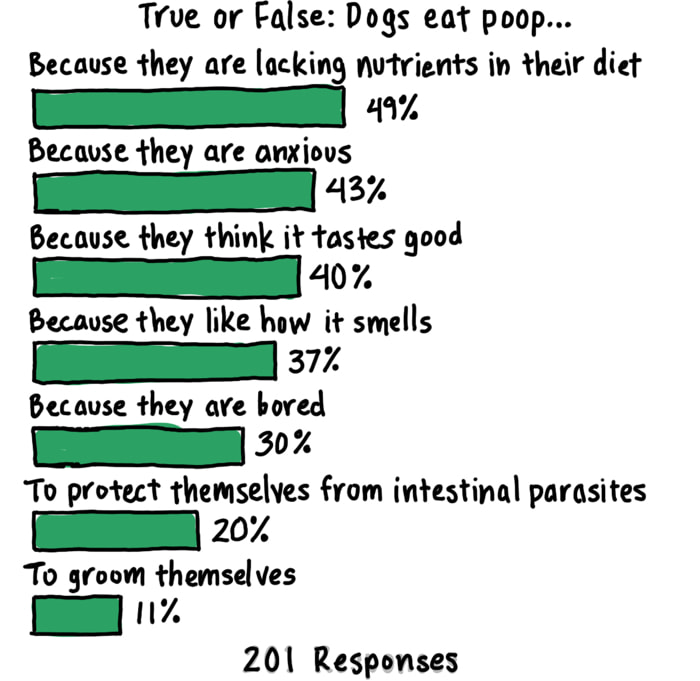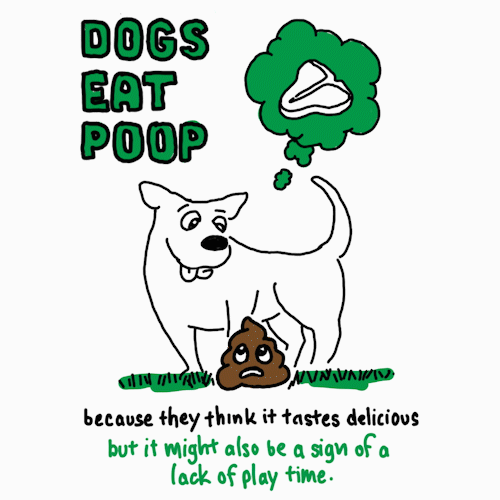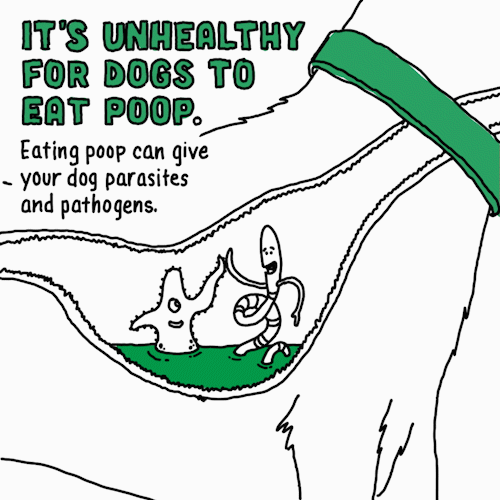

Like any companion or roommate, dogs — for all their love and cuteness—have habits we just don’t understand. One question dog owners often ask their pets: “Why? Why would you eat poop?”

When we polled* dog owners recently, most thought it was because a dog is lacking nutrients (49%), they’re anxious (43%) or they just think it tastes good (40%).
Dogs are significantly more likely to eat the droppings of another species (e.g., horses, rabbits) than their own.
We held our noses and got to the bottom of the issue with the help of some experts.
While those in our poll thought this was the number-one reason for the behavior, it has actually never been proven. “It’s a myth dogs eat poop because they’re seeking nutrients they aren’t getting. There’s no evidence to back this,” says
Opens a new windowDr. Jo Gale, BVetMed CertLAS MRCVS, Senior Manager, Global Science Advocacy at Waltham Petcare Science Institute.

According to Opens a new windowDr. Tammie King, Applied Behavior Technical Leader at Waltham Petcare Science Institute, “It can occur where there is lack of environmental enrichment. You see this often in dogs who are kenneled and have a lack of opportunity to exhibit normal canine behavior.” So if you need another excuse to get out and play with your pooch, this is a good one.
Believe it or not, this is the main reason dogs eat poop. Dr. Jo Gale explains: “Dogs are scavengers by nature and use any opportunity to eat what they can, when they can. They consider it a ‘tasty snack.’” Dr. Tammie King adds that “[Dogs eating poop] is a learned behavior. They’ve done it, enjoyed it, and that behavior is repeated.”
We love our dogs so much that we’re willing to trust our best friends on this. Maybe we should come out with a line of doggie breath mints though. Hmm.

“Ingesting feces from any animal increases potential for ingesting parasites and pathogens,” cautions Opens a new windowDr. James Serpell BSc, Phd Professor of Humane Ethics & Animal Welfare at University of Pennsylvania School of Veterinary Medicine. He went on to say, “[It’s] not something humans should ignore, but it's not worth getting too excited about it.”
All the experts we consulted said that if your dog occasionally eats poop, it’s nothing to be overly alarmed by. Just keep an eye on the frequency and their overall health. And as always, make sure they’re getting a nutritious diet and plenty of exercise and attention. If you have any concerns contact your vet.
Despite dogs liking the taste of poop, we’re going to stick with the healthy range of more traditional flavors offered in all IAMS dog foods.
*Surveyed U.S. dog owners, age 18+
Sample Size: n=201
Fielded May 8 to May 10, 2020


When it comes to maintaining the overall health of our dogs, we often overlook the importance of their gut health. This is where canine probiotics and prebiotics come into play. These are beneficial microbes that reside in your dog's gastrointestinal system, aiding in food digestion, fighting off potential pathogens, and bolstering the immune system.
Probiotics for dogs, derived from the Latin word 'for' (pro) and the Greek 'life' (bio), are friendly bacteria and yeasts that are essential for your dog's health. They are designed to restore and maintain a healthy balance of microflora in your dog's gut. The types of bacteria usually found in canine probiotics include:
Prebiotics may sound like the opposite of probiotics, but in reality, the two go hand in hand. Prebiotics are nutrients that nourish and promote the growth of these good bacteria already living in the colon. They are essential in ensuring that probiotics function at their optimal best.
Probiotics are a necessary addition to a dog’s diet. Here are a few benefits of this nutrient:
They are generally used when the balance of microbes in a dog's gut gets disrupted due to stress, dietary changes, or antibiotic use, leading to health problems including digestive upsets.
Probiotics for dogs have been shown to help manage diarrhoea and improve gut health. They work by restoring the balance of good bacteria in your dog's gut, which can be disrupted due to various factors.
The benefits of probiotics for dogs extend beyond just good gut health. They can also aid in reducing the need for antibiotic treatment and shorten the duration of diarrhoea. In fact, a 2009 Irish study found that supplementation with a specific strain of Bifidobacterium Animalis reduced diarrhoea duration from seven to four days.
The answer is yes. Puppies can benefit from dog-specific probiotics. These can help them develop a balanced intestinal bacteria ecosystem, support a healthy immune system, and reduce the occurrence of diarrhoea, constipation, and infections of the digestive tract.
Yes, it's critical to consult your vet before introducing probiotics or prebiotics for dogs into your pet's diet. There are many probiotic preparations out there, and not all of them are of high quality and backed up with evidence. Your vet will be able to advise the best option for your dog.
As the importance of gut health in dogs becomes more recognised, various supplements containing canine probiotics have emerged. One such supplement is our IAMS™ Proactive Health™ Digestive Health Supplement. This soft-chew food supplement is a blend of prebiotics and probiotics that ensures healthy digestion.
If your dog has been experiencing signs like diarrhoea, constipation, bloating, or vomiting, it might indicate that their digestive system is not functioning properly. In this case, a probiotic supplement with Bacillus Subtilis and Fructooligosaccharide can be a good investment. They help degrade organic matter in the feces, reducing ammonia production and fecal odour as well as nourish the good bacteria in the colon of the dog.
The benefits of probiotics for dogs are substantial. They help maintain a healthy gut, which plays a vital role in your dog's overall health. By incorporating probiotics into your dog's diet, you're taking a step towards ensuring that your furry friend leads a healthier, happier life.


When it comes to maintaining the overall health of our dogs, we often overlook the importance of their gut health. This is where canine probiotics and prebiotics come into play. These are beneficial microbes that reside in your dog's gastrointestinal system, aiding in food digestion, fighting off potential pathogens, and bolstering the immune system.
Probiotics for dogs, derived from the Latin word 'for' (pro) and the Greek 'life' (bio), are friendly bacteria and yeasts that are essential for your dog's health. They are designed to restore and maintain a healthy balance of microflora in your dog's gut. The types of bacteria usually found in canine probiotics include:
Prebiotics may sound like the opposite of probiotics, but in reality, the two go hand in hand. Prebiotics are nutrients that nourish and promote the growth of these good bacteria already living in the colon. They are essential in ensuring that probiotics function at their optimal best.
Probiotics are a necessary addition to a dog’s diet. Here are a few benefits of this nutrient:
They are generally used when the balance of microbes in a dog's gut gets disrupted due to stress, dietary changes, or antibiotic use, leading to health problems including digestive upsets.
Probiotics for dogs have been shown to help manage diarrhoea and improve gut health. They work by restoring the balance of good bacteria in your dog's gut, which can be disrupted due to various factors.
The benefits of probiotics for dogs extend beyond just good gut health. They can also aid in reducing the need for antibiotic treatment and shorten the duration of diarrhoea. In fact, a 2009 Irish study found that supplementation with a specific strain of Bifidobacterium Animalis reduced diarrhoea duration from seven to four days.
The answer is yes. Puppies can benefit from dog-specific probiotics. These can help them develop a balanced intestinal bacteria ecosystem, support a healthy immune system, and reduce the occurrence of diarrhoea, constipation, and infections of the digestive tract.
Yes, it's critical to consult your vet before introducing probiotics or prebiotics for dogs into your pet's diet. There are many probiotic preparations out there, and not all of them are of high quality and backed up with evidence. Your vet will be able to advise the best option for your dog.
As the importance of gut health in dogs becomes more recognised, various supplements containing canine probiotics have emerged. One such supplement is our IAMS™ Proactive Health™ Digestive Health Supplement. This soft-chew food supplement is a blend of prebiotics and probiotics that ensures healthy digestion.
If your dog has been experiencing signs like diarrhoea, constipation, bloating, or vomiting, it might indicate that their digestive system is not functioning properly. In this case, a probiotic supplement with Bacillus Subtilis and Fructooligosaccharide can be a good investment. They help degrade organic matter in the feces, reducing ammonia production and fecal odour as well as nourish the good bacteria in the colon of the dog.
The benefits of probiotics for dogs are substantial. They help maintain a healthy gut, which plays a vital role in your dog's overall health. By incorporating probiotics into your dog's diet, you're taking a step towards ensuring that your furry friend leads a healthier, happier life.